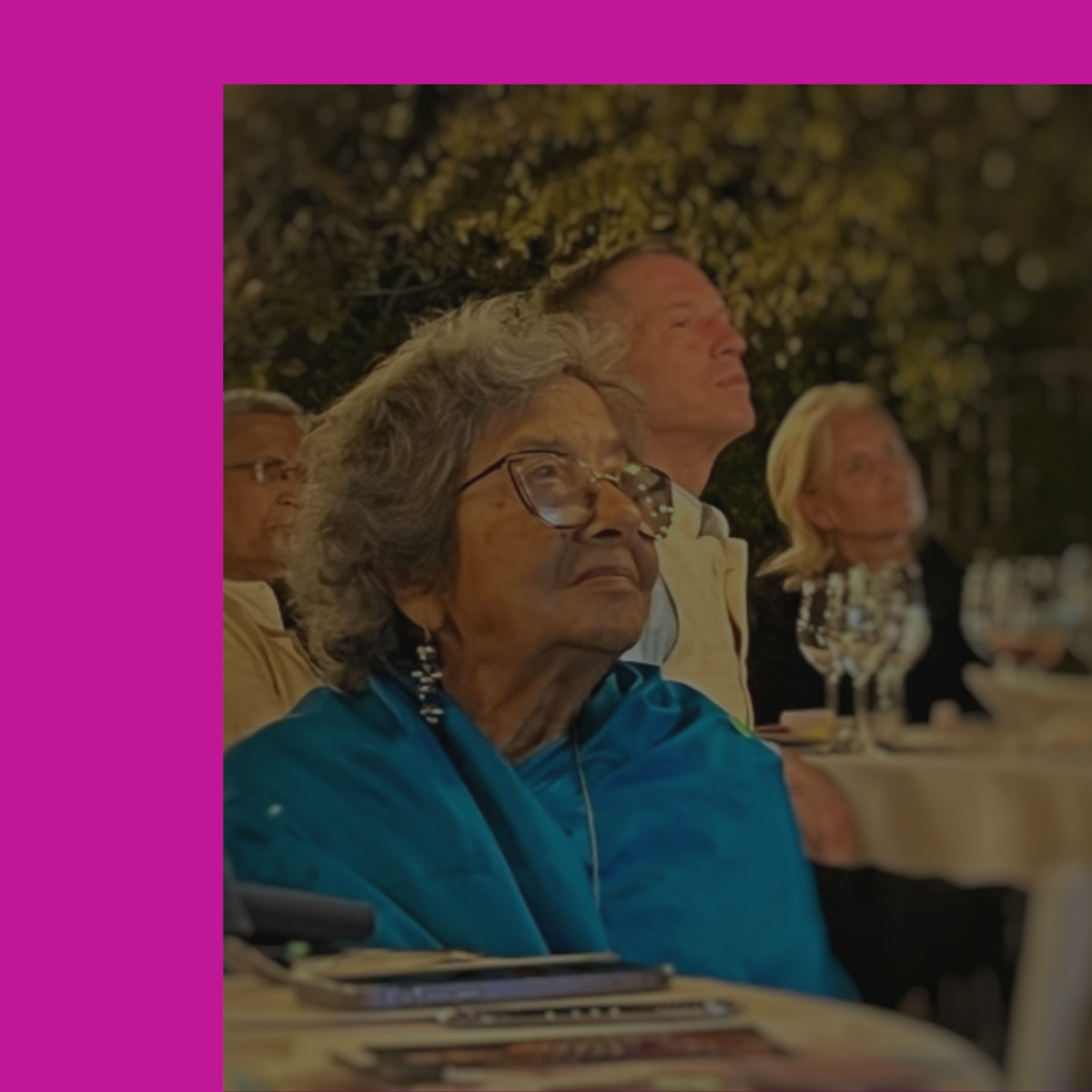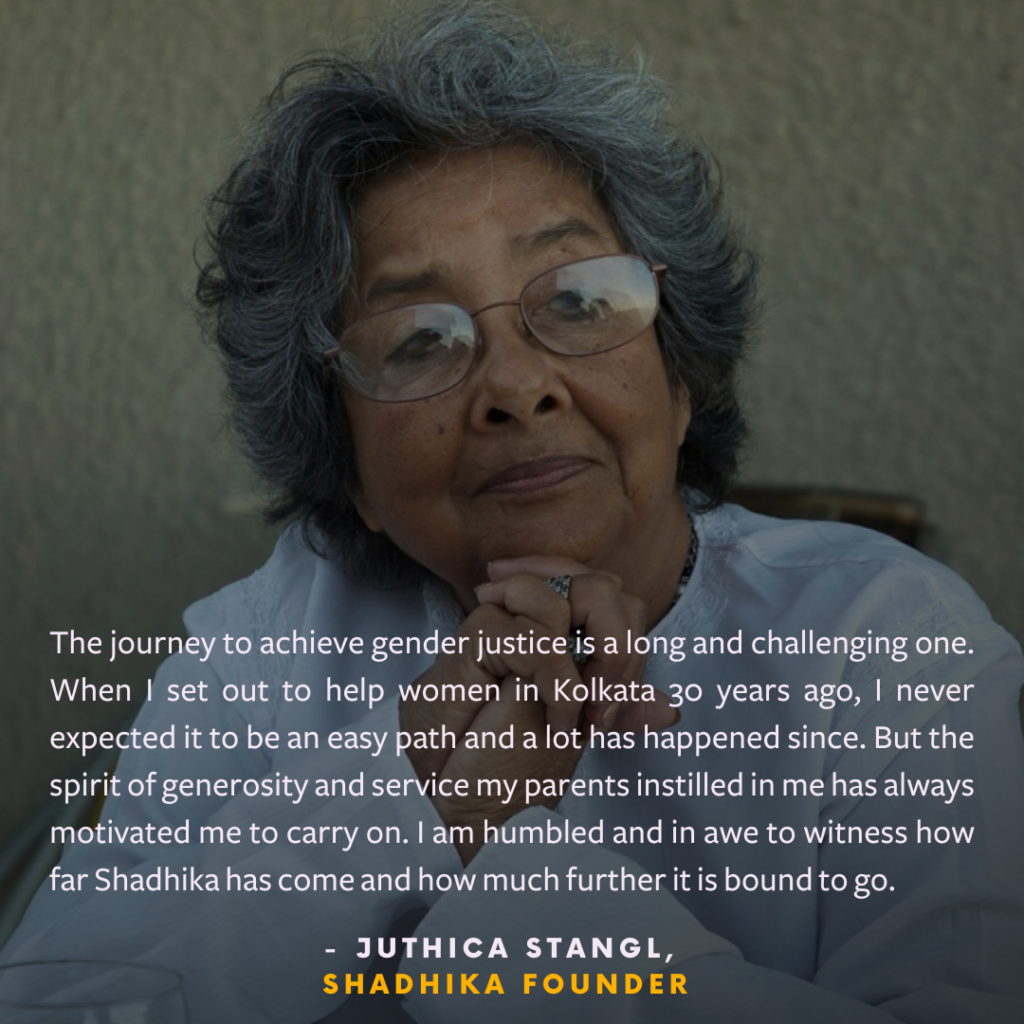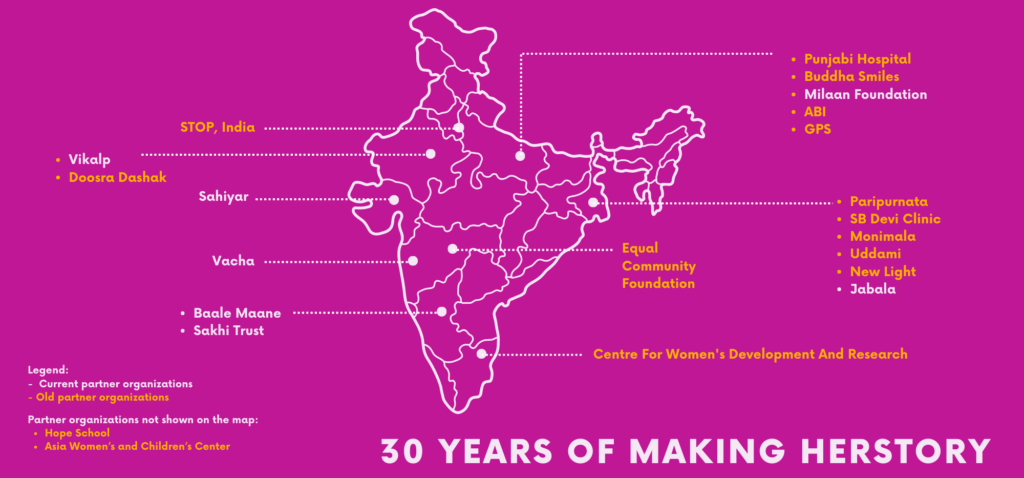
I watched my parents, growing up, do that- wanting to help other women and other people. It was in my blood.
When She Leads: Juthica Stangl
October 20, 2022
Reading Time: 6 minutesThis interview is part of our When She Leads series. Learn more.
30 years ago, Shadhika founder Juthica Stangl took the first step in what would become a three-decade-long pursuit of gender justice for women across India. Read more about this incredible journey spanning 30 years and how it came together from Juthica and Peter Stangl.
- Tell us the story of what inspired you to start Shadhika. What challenges did you see? What did Shadhika look like when you started it?
Shadhika starting was a natural thing for me. I grew up in a family where my parents were very giving and would help out anybody they could. I watched my parents, growing up, do that- wanting to help other women and other people. It was in my blood.
After I finished graduate school in Delhi, I started working at the Calcutta (now Kolkata) YWCA. It had a program where we would go to the prison and work with some of the prisoners there. I went on one of these trips and saw all these women there who were kind of lost and didn’t know what they were doing there.
We were told not to ask how they got there but I could not stop, I had to find out. I asked one of the women how she ended up in the prison, in this ward for ‘non-criminal lunatics.’ She told me, she was married but did not have any children living. When her husband died, they kicked her out of the house because no one wanted to support her.
There was no facility to help the homeless. Men homeless on street were tolerated but women were picked up and put in prison. When I found how about these women, I wondered how these women can be taken out of there. I was 21 years old. I tried to contact Congress women. Everyone told me to go away because these women had a roof over their heads, and were given 2-3 meals per day. I never forgot them.

In around 1972, in a Bengali magazine, I read that one of the girls from the prison had written a letter to anyone who might be able to help her. The letter arrived in the courthouse there. A lawyer was willing to look into this and tried to figure out how this woman can be brought out of the situation. When I read about him, I thought I could get in touch with the lawyer to do something about this. He said he was trying to get these women out but there is no place to put them. He gave me the idea of starting a halfway home where these women could live.
In around 1990, I got a call from Dr Siromoni who had established a halfway house in south India and was transferred to Calcutta. She helped find a building to house the women.
Dr Siromoni did the legwork in Kolkata. Went from government office to government office. She was given part of a building. The courthouse had space that they would give us. Series of buildings connected, they gave her one part of one building that did not have a roof. Devoted 2 rooms. One for the office and one for housing the women. Paripurnata, the halfway home, opened in 1991. My vision was to build a halfway house to train the women to stand on their own feet.
Some women had families but many did not take them back. There were 9 women in the first batch at Paripurnata. Around 1996, we then shifted from supporting prison to rehabilitated mental health patients.
Shadhika’s reach beyond the transition home in West Bengal to organizations that provide wraparound services and education support to girls and young women in other states.
Over the last 30 years, Shadhika has given more than $2 million in grant funding, including nearly $500,000 in college scholarships. Since 2004, Shadhika has reached 13,822 estimated girls, providing them with rights to education, skills building, and academic tutoring.
- What was most challenging in those first days?
In the beginning, it was about how do I get these women out of prison, those who were just there. They didn’t do anything. Some of these women were really psychotic. And I went to prison and saw that these women are mixed with totally naked women and ‘normal’ women, all put together like in a cage, that was a huge shock to me. That was my main purpose then, how to get these women out of there. I consider myself, not rich, but we were always willing to share what we had. And watching these women, put in a cage like that, really shook me up to the core. I had to do something.
Peter Stangl: The challenge in the early days of Shadhika was how to get some of these well-to-do Indians living in this area to contribute something to the Shadhika project operating in Kolkata. We were much more successful in getting our non-Indian friends to contribute.

- What gave you hope and helped you persevere in the early days?
I felt that if we keep at it, and not give up, we would accomplish something. I was not going to give up. If I take on a project, I want to see it to the end.
- What message would you want to give to the past, present, and future girls of Shadhika?
People who got help, should be willing to help others. Because you got help, that’s not where it ends. If you got help, do the same for other people.
Read a post from 2020 by Peter Stangl, Shadhika’s Co-Founder, on what the legacy started 30 years ago means to them today. Read the post here.
Read more